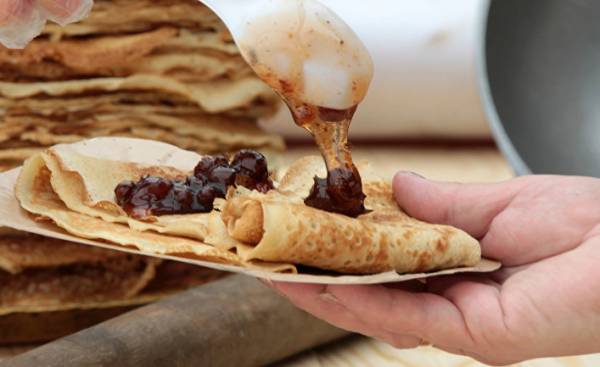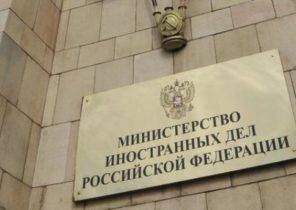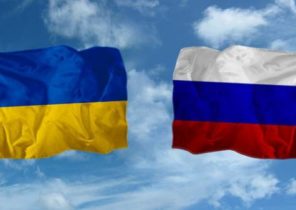
In a world where around Russia continue to multiply questions and conspiracy theories, the Americans Russophile can still be confident at least in the pancakes, which are still unambiguous.
For the uninitiated pancakes, this is the Russian counterpart of the French crepes, thin pancakes that are wrapped sweet cheese, ground meat or the salmon spawn. In contrast to their French relatives, Russian pancakes made of yeast dough, they are lighter and airy, with a sour taste that complements sweet toppings, and the taste of salt makes it more difficult.
Pancakes in Russia is so ubiquitous that the word is even used as a mild expletive: polite Russian can mutter it, such as hitting the toe, instead of swear words “*****”.
In any Russian cafes and even in the most ordinary dining in the Soviet style, you can find a range of pancakes with their traditional condiments: sour cream for sour and spicy pancakes, a thick strawberry and cherry jams for sweet. In “Dead souls” by Gogol greedy and immoral Chichikov expressed its essence when “turned three fucking together”, loaded all at once in melted butter and “put the mouth”.
In new York more Russian residents than any other metropolis of the United States, but two-thirds of them live in Brooklyn, and the outposts of Russian culture in Manhattan tend to be more solid compared to the pastry along the sea and markets in Brighton beach.
Russian tea room on Fifty-seventh street — perhaps the most famous example of all this — was founded in 1927 by members of the Russian Imperial ballet, and its menu offers caviar at $ 300 per ounce and Russian dumplings stuffed with foie Gras. Recently, however, as a native Russian and native English speakers have the opportunity to enjoy pancakes without much ADO or a long trip to Brooklyn. One of the largest fast food chains Teremok got to Manhattan and began to supply the Russian fast-food many tourists and residents hurrying to and from work.
Teremok, this modest supplier of Russian food, ridiculously ubiquitous in Moscow. City map with markers on the location of its restaurants and stalls decorated with the logo with the doll, like the skin of a Dalmatian. In Saint-Petersburg is also a considerable number of them, as well as in less famous cities like Surgut, Tyumen and Krasnodar.
Two of its branch in new York on Union Square and in Chelsea — the first steps of the network outside of Russia made the result of years of training. Why America? In an interview with the Russian Daily journal Forum network founder Mikhail Goncharov gives a simple answer: “It is the birthplace of fast food”.
Goncharova’s career, as it has for many years described the journalists is a story with a pronounced Russian specificity of individual selected “from rags to riches” in the field of fast food. His sketchy capitalist instincts formed into something definite crisis in 1990-e years, Russian society and the economy then faltered and barely hobbled forward after the collapse of the Soviet Union.
Raised in Almaty, Kazakhstan’s largest city, potters felt the first taste of entrepreneurship, studying mathematics at Moscow state University, where he was one of many students who washed Windows for pocket money. He was inspired, and he invented something of his own, as he later told the Russian magazine Food Service: “walking down the street, see, for example, the building of the Ministry of transport and communications with black dusty Windows… Go inside and ask: “and whether you need Windows to wash?”” Most of all, he wanted to have the funds for expensive imported goods — which was a luxury in the Soviet Union. At the time, he said, the bars are “Snickers” was a symbol of “a better life” for University students.
His first business adventure in the wilds of post-Soviet capitalism, associated with the sales of cassettes have failed during the financial crisis in 1998, when the ruble collapsed and the Russian government defaulted on its debt. Taking out a Bank loan, and collecting the remains of the capital, he turned to the quintessential Russian product: to pancakes. The potters saw a chance in this favourite, compact and quickly cooked dish.
With the help of his mother Tatyana, he launched a chain of restaurants of Russian cuisine is so authentic that even the original recipe was pancakes based on a recipe from the cookbook “a Gift to young Housewives” by Elena molokhovets, whose 500 recipes did its Russian counterpart Fannie Farmer (Fannie Farmer). The network has steadily expanded since the 1990s, not without the usual in Russia podmazyvanija in the traditional culture of bribery.
In an interview with “Snob” Goncharov said, as he joined those entrepreneurs who participated in the tender for the purchase of the kiosk of the Prefecture of one of the districts near the building was a parked jeep with an open suitcase in the trunk prepared for bribes from those who signed their contracts. “You two points given? You 400 thousand,” — said Goncharov, quoting someone who was accepting bribes. “The money was folded in a suitcase.” Goncharov proved that masterful can cope with the navigation of the Russian art system: the number of co-owners of the network consists of the brothers of deputies and oligarchs. About his activities in new York, he said, “Snob”: “the Bureaucratic system there does is no different from ours, it is quite powerful.”
For the Russian “Teremok” — is the quintessence of fast food: a plume of fragrant steam from convolution delicious test in the St. Petersburg winter day, a bowl of homemade buckwheat and eggs at lunchtime on a weekday. The sprawling menu includes many favorite Russian foods, from pancakes and cheesecakes to small pieces of dough with meat “dumplings.” As one of my a fondness for Russia friend: “I don’t ever really feel after eating there, in a good way.”
In the US, where pancakes and soup still remain for the most exotic, Teremok has altered its slogan from “Restaurants home food” to the usual “Where taste meets health”. Ubiquitous in Russia, buckwheat porridge is served as a “super food”, a common Russian beetroot raskalivaetsa for their vitamins. Branch Union square brilliant, clean, devoid of bright colors and bold slogans that adorned the Moscow restaurants.
However, the essence of charm “Teremok” — its food survived the journey across the Atlantic. Damn “Red star” offers you a rich salted salmon wrapped in hot, Lacy batter, which will bring in minutes. Ear — salmon chowder with smoked meat was thick and hot, despite the fact that I left my heart ear in one small town in the Danube Delta. Sweet pancake with whipped honey and pine nuts kept the memory of the coniferous forests of Siberia, which I drink black and bitter espresso with foam edging. These pancakes are too large to stuff in your mouth at once three, as did Chichikov, but you can imagine that the avaricious character of Gogol in any case, such an act would be retained, and the price — from 8 to 10 dollars for each pancake. (Russian headlines scream that the price of “Teremok” in new York tipped the scales in Moscow pancake with sour cream will cost you two dollars).
The branch at Union square opened in October, somewhere between the first the scandal over the hacked e-mail of the Democrats and the resignation of Michael Flynn, in connection with his inappropriate contacts with the Russian Ambassador. When I asked the cashier, affected how vague the role of Russia in U.S. policy on buyers, she shook her head and said that he didn’t know what I’m talking about. Colleague soothingly put his hand on her shoulder: “It’s all dirty money of Putin,” she said. At the end of the day the customers were few. In response I heard only the sound of my frying pan pancake and the tinkle of spoons.







